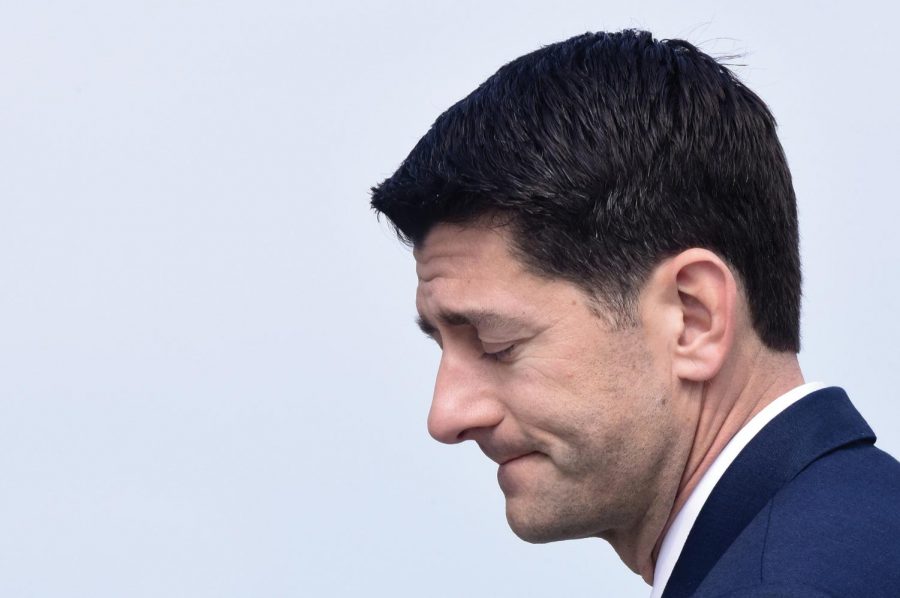Paul Ryan: Out with a Whimper
Photo courtesy of TRibune News Service
House Speaker Paul Ryan attends the annual Friends of Ireland luncheon on Capitol Hill on March 15 in Washington, D.C.
Apr 16, 2018
Paul Ryan is set to retire from his position as Speaker of the House of Representatives, and as representative from Wisconsin’s 1st District, at the end of this term. The Speaker claims that the sole reason for his departure from Congress comes from a desire to spend more time with his family. Having spent nearly 20 years in Congress (Ryan was first elected in 1998 at only 28 years old), it is understandable that such a demanding job can take away from raising a young family to a father’s fullest extent. But to many, his explanation seems a bit short.
Speculation will fly as to what the “real” reasons are for the Speaker’s retirement. One includes the Republican Party, once the bolster of fiscal responsibility and the free market, which is turning into a party of populist appeal. For a man once considered an ambitious fighter of principled conservatism, maybe Ryan would rather not go down with the ship.
Regardless of the reasons behind Ryan’s departure, what will be most remembered about his tenure was his rise as a deficit hawk brought into the Speaker position by the Tea Party movement, to his fall of political prominence as a Trump enabler.
His ascension to the national stage was catalyzed by relentless attacks on the Obama Administration for running budgets deficits, yet he authorized a tax bill that will expand the deficit by $1.9 trillion in the next 10 years. One possible reason for this is that in a crucial election year, with many Republican seats at risk, saving the average American a few hundred dollars may keep, or sway, their loyalty to the Republicans.
This is the aspect of Ryan’s career that he never had much of a problem with: winning.
Get The Daily Illini in your inbox!
During his 20-year tenure as a representative from Wisconsin’s 1st District, he has won every congressional race since his first election, with an average of 63.4 percent of the vote. This was certainly a factor as to why he was thought of as a potential successor to John Boehner. His wits and numerical evidence for balanced budgets made him a strong conservative player in the political game, and he became accustomed to political success during his tenure at the House Budget Committee from 2011 to 2015.
But the reality many politicians face once they take office, especially higher office, is that the world is not so black and white. With Ryan as Speaker of the House, the Freedom Caucus, an ultra-conservative wing of the Republican party, and moderate Republicans alike believed they had their best player to guide policy that would truly be in the American interest.
Reality tells a very different story.
Though Ryan may fundamentally believe that the best outcome for America is one in which the wealthy benefit from low taxes and low accountability, while the poor are cut from economic safety nets, most Americans do not think that way. Ryan’s welfare-less, regulation-less American state turned out to be nothing more than a fantasy molded in the eyes of financial elites, detached from the reality of the American people.
The result of Ryan’s apparent slickness and intelligence is best put by The Atlantic’s Derek Thompson: “For all his singular laurels, Paul Ryan turned out to be a cliche.” It’s these cliche figures like Ryan who were the campaign targets of populist leaders like Donald Trump, meshing the Capitol insiders and politicians as part of an unholy “swamp” of Washington, actively working against the interest of the American people.
Perhaps recognizing his shortcomings, Speaker Ryan may have planned to retire upon a Hillary Clinton victory. Working with another Democratic president would certainly not have been appealing, in addition to fearing the overall direction his party was headed. However, once Trump won the election, Ryan may have either seen an opportunity with a Republican president or, on the opposite end, felt obligated to guide the party in this tumultuous stage.
Regardless if there is any truth to that idea, Ryan failed to act as the leader he was positioned to be. The most powerful man in Congress, with a united government, could not deliver on reforming health care (which he considers his biggest failure), could not protect American trade interests abroad and could not protect Deferred Action for Childhood Arrivals recipients, who he vowed Congress would protect. Instead, he failed to rally Congress around health care while stepping aside and letting the president haphazardly make statements and decisions on trade and DACA without Congress.
All things considered, holding political office is not an easy job, let alone at the nation’s highest level. Regardless, there are those who do the job well and those who do not. Perhaps Paul Ryan and the rest of us can learn from his experience that winning is easy, but governing is harder.
Austin is a sophomore in LAS.






